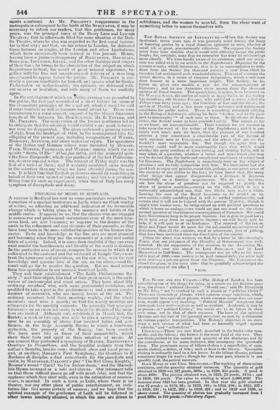PROGRESS OF MUSIC IN SCOTLAND.
A raraxo in Scotland has sent us some particulars respecting the formation.of a musical institution in Leith, which we think worthy of notice, as affording an additional indication of the favourable change which is taking place in the manner s and habits of the middle ranks. It appears to us, that the classes who are engaged in commerce and professional occupations even of the most labo- rious kind, are now ]becoming as superior to the drones of the earth in the refinement and real elegance of their pursuits, as they have long been in the more substantial qualities oldie human cha- racter. Taste and knowledge in the tine arts arc most graceful and becoming when they are the ornaments of a solid and useful fabric.of society. Indeed, it is more than doubtful if they can even exist amidst the heartlessness and frivolity of the world of thshion. In the particular case of music, compare the manner in which it is cultivated to the eastward and the westward of Temple Bare—con- trast the ignorance and affectation, on the one side, with the real knowledge and genuine love of the art, on the other,—and the result will go far to resolve the question. But we must return from this speculation to our musical friends at Leith.
They call their establishment "The Leith Philharmonic So- ciety ;' and their object, like that of their great model, is the culti- vation of instrumental and vocal music. They have about fifty ordingry members: who, with some professional assistance, are qualified to take a part in the performances; and a much vreater number of associates, who are merely lovers of the art. The ordinary members hold their meetings weekly, and the whole members meet once a month; so that the weekly meetings mime rehearsals for the monthly concerts. 0e:asionally they give per- formances on an exten-ive scale, to which the friends of the mem- bers ate invited. Although only established in March last, the Society, a week or two ago, was able to give a musical pA•forni- ance to an assembly of above four hundred ladies and gen- tlemen, in the large Assembly Room; in which a handsome orchestra, the property of the Society, has been erected. We have seen two or three of their concert-bills, which show their taste and spirit in their selection of music. At one concert they performed a symphony of HAYDN, BEETHOVEN'S Overture to Prometheus, and the beautiful andante from that author's Sestetto, besides some standard glees and vocal pieces ; and, at another, MozART's First Symphony, the Overture to 11 Barbiere di Siviglia, a duet concertamite for the pianoforte and violin, by M.i.vsEDER, CALCOTT'S glee "The-Red Cross Knights," BISHOP'S round " Hark! 'tis the Indian drum," and the Marsed- lois Hymn arranged as a solo and chorus. Our informant tells us that these difficult pieces go off with much eclat, and that the applause which they meet with, even in the estimation of connois- seurs, is merited. In such a town as Leith, where there is no theatre, nor any other place of public entertainment, an insti- tution like this seems certain of success; and we hope that the spirited example of the gentlemen of Leith will be followed in other towns similarly situated, in which the men are driven to
sottishness, and the women to scandal, from the sheer want of something better to amuse themselves with.


























 Previous page
Previous page